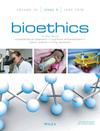减值论的意外之喜。
IF 2.1
2区 哲学
Q2 ETHICS
引用次数: 0
摘要
根据亨德里克斯损害论(IA),堕胎是不道德的,因为它损害了胎儿。在这里,我认为仅仅证明堕胎对胎儿有害是不够的,亨德里克斯必须证明堕胎对胎儿有害。如果胎儿在数字上与将要成为的人不一样,那么它就不会受到堕胎的伤害。但如果胎儿在数字上与未来的人完全相同,那么它就被剥夺了未来的价值。然而,走这条路最终会削弱损害论的新颖性。本文章由计算机程序翻译,如有差异,请以英文原文为准。
The Impairment Argument's Coup de Grâce
According to Hendricks Impairment Argument (IA), abortion is immoral because it impairs the fetus. Here, I argue it is not sufficient to show merely that abortion impairs, Hendricks must show that it harms the fetus. If the fetus is not numerically identical to the person it will become, then it isn't harmed by an abortion. But if the fetus is numerically identical to the person it will become, it is harmed by the deprivation of a future of value. However, taking this route ultimately undermines the novelty of the impairment argument.
求助全文
通过发布文献求助,成功后即可免费获取论文全文。
去求助
来源期刊

Bioethics
医学-医学:伦理
CiteScore
4.20
自引率
9.10%
发文量
127
审稿时长
6-12 weeks
期刊介绍:
As medical technology continues to develop, the subject of bioethics has an ever increasing practical relevance for all those working in philosophy, medicine, law, sociology, public policy, education and related fields.
Bioethics provides a forum for well-argued articles on the ethical questions raised by current issues such as: international collaborative clinical research in developing countries; public health; infectious disease; AIDS; managed care; genomics and stem cell research. These questions are considered in relation to concrete ethical, legal and policy problems, or in terms of the fundamental concepts, principles and theories used in discussions of such problems.
Bioethics also features regular Background Briefings on important current debates in the field. These feature articles provide excellent material for bioethics scholars, teachers and students alike.
 求助内容:
求助内容: 应助结果提醒方式:
应助结果提醒方式:


